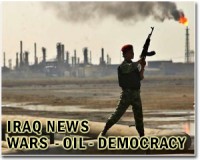 |
Baghdad (AFP) May 5, 2010 Iraq inched towards a new government Wednesday with power set to be vested once more in the hands of Shiite religious parties that have close ties to Iran, pushing Sunni-backed secularists to the margins. A deal was struck late on Tuesday between the war-torn country's two biggest Shiite Muslim alliances, allowing them to squeeze out a secular coalition that won a March 7 general election but failed to build a parliamentary majority. The agreement, struck after two months of haggling that paralysed politics and alarmed the United States ahead of its planned military withdrawal from the country, was condemned by the secular bloc as "a sectarian merger." Discussions about who will become premier are now under way between the Shiite parties, an official from incumbent Prime Minister Nuri al-Maliki's State of Law bloc told AFP. However, it is widely believed the price of the agreement between State of Law and the Iraqi National Alliance (INA) was a commitment that Maliki would not continue in the post. There was no immediate reaction from Washington, which in the past week urged Iraqi politicians to set aside their differences and speed up the process of forming a coalition capable of running the country. American combat troops are due to pull out of Iraq by September, ahead of a complete military withdrawal at the end of 2011, and the seating of a new government in Baghdad is key to Washington's exit strategy. There was no comment either from ex-premier Iyad Allawi, head of the Iraqiya list, which took the greatest number of seats, 91, in the March ballot because of strong support in Sunni areas where voters had boycotted previous polls. Iraqiya spokeswoman Maysoon Damaluji, however, pointed the finger at Iran and labelled the alliance "a sectarian merger" that brought Iraq "back to square one." "The Iraqiya list and the national project have been targeted and we feel that this merger was designed by regional powers," Damaluji told AFP. Allawi now faces a fight for representation in government to stop his coalition becoming marginalised and to halt a surge of resentment among Sunni voters who could be disenfranchised and shut out of politics once again. The new Shiite coalition remains four seats short of the 163 needed to form a parliamentary majority, but is still likely to take office. According to full preliminary results from the election, State of Law won 89 seats in the 325-member Council of Representatives while the INA, led by Shiite religious groups, won 70 seats. The Kurdish Alliance, made up of Iraq's autonomous northern region's two long-dominant blocs and holding 43 seats, has previously said it would join the coalition once the two main parties sorted out their differences. A spokesman for the Kurdish alliance said the Shiite merger was a positive move but steps must now be taken to include all parties in the new government. "One coalition is the right way to free the current Iraqi policy from its crisis... but everyone should take take part in the formation of the coming government," said Sammy Shorash. The final number of seats gained by each party could yet change as electoral authorities are conducting a recount of votes in the key Baghdad constituency, which accounts for 70 parliamentary berths. Negotiations between State of Law and the INA heated up in recent days after weeks of deadlock, with the two sides having principally disagreed over whether Maliki should remain in office. Although Maliki won more votes than any single candidate, he is reviled by the Sadrist bloc of eponymous radical Shiite cleric Moqtada al-Sadr and by the Supreme Iraqi Islamic Council, the two main groups within the INA. The statement announcing the new pact was read by Abdul Razzaq al-Kadhami, an adviser to INA candidate Ibrahim Jaafari, Maliki's predecessor as premier, in a symbolic move that hinted Jaafari could return to power. "The most important thing is to form an Iraqi government, to establish a government programme and to nominate the next prime minister," said the statement, which was read out at Jaafari's residence in Baghdad.
Share This Article With Planet Earth
Related Links Iraq: The first technology war of the 21st century
 Iraq deadlock broken as Shiite parties join forces
Iraq deadlock broken as Shiite parties join forcesBaghdad (AFP) May 4, 2010 Iraq looked headed for a new government Tuesday after the country's two biggest Shiite Muslim alliances struck a deal following months of post-election haggling that had brought politics to a standstill. The agreement will allow the nation's Shiite religious parties to cling to power and see off the challenge of a secular alliance which won a March 7 general election with strong Sunni backin ... read more |
|
| The content herein, unless otherwise known to be public domain, are Copyright 1995-2010 - SpaceDaily. AFP and UPI Wire Stories are copyright Agence France-Presse and United Press International. ESA Portal Reports are copyright European Space Agency. All NASA sourced material is public domain. Additional copyrights may apply in whole or part to other bona fide parties. Advertising does not imply endorsement,agreement or approval of any opinions, statements or information provided by SpaceDaily on any Web page published or hosted by SpaceDaily. Privacy Statement |